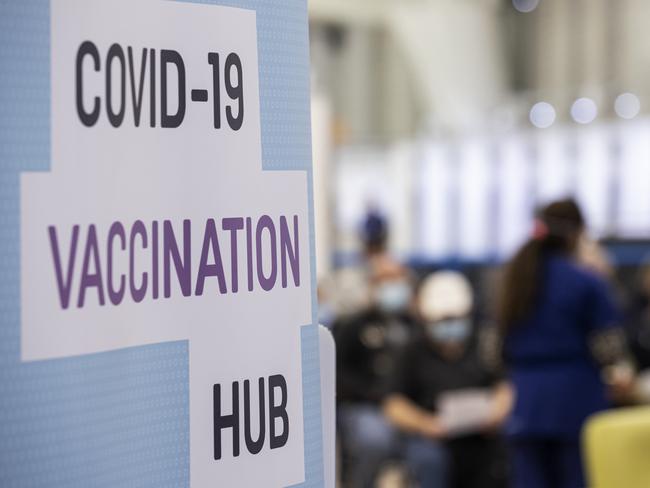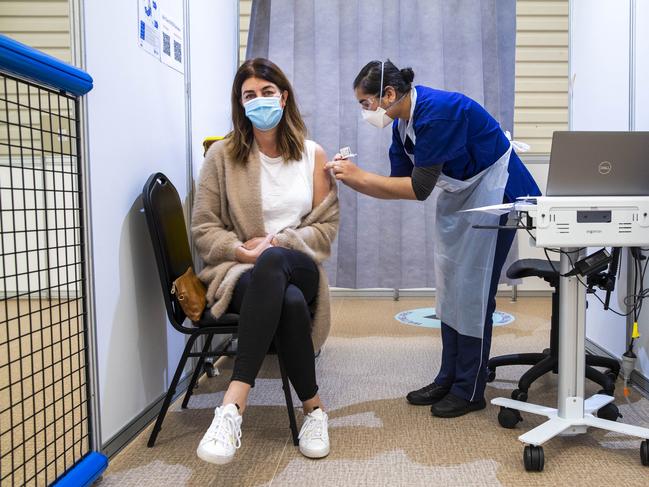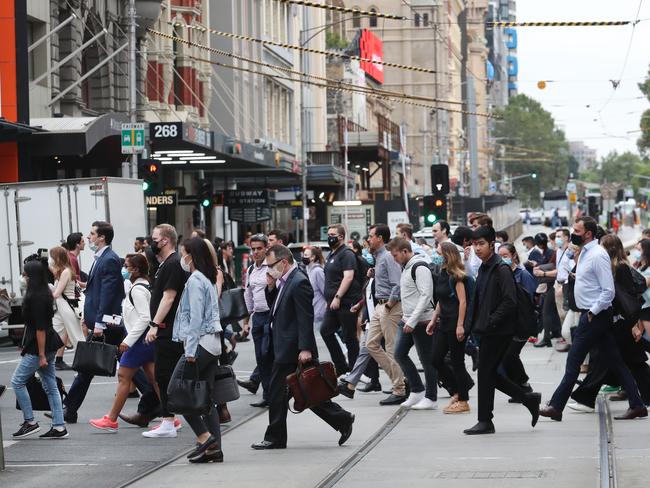Concerning reason Covid cases are set to rise
Victoria’s health system is facing a disastrous winter, with fears the “Son of Omicron” will cause a Covid case spike as a bad flu season wreaks havoc.
Coronavirus
Don't miss out on the headlines from Coronavirus. Followed categories will be added to My News.
Victoria’s Covid case numbers could soon begin to soar again as a highly infectious sub-variant of Omicron becomes the dominant strain.
It follows forecasts that daily case figures in New South Wales could spike to 25,000, with the BA.2 subvariant continuing to sweep across the country.
Health Minister Martin Foley said the variant – which has been referred to as the “Son of Omicron” – is “slowly but gradually asserting itself” as the more dominant strain across Victoria.

“We do have advice that it is more infectious but I don’t have specific advice as to the rate of that, but I’ve got no reason to disbelieve the NSW evidence,” he said.
“It aligns with international evidence and we would expect that over time the sub BA.2 variant will become the dominant variant.”
It comes as the president of the Australian Medical Association warned health experts were “really worried” ahead of the winter months.
Professor Omar Khorshid said while it was expected for Covid cases to spike during the colder months, a potential flu season could cause havoc on the health system.
“We’re really worried about this winter. Not so much because, you know, Covid is a devastating virus in winter - it’s probably going to have a bit of a spike in winter - but because we’ve got this perfect storm of a health system ... that hasn’t had the investment it needs over long periods of time,” he told ABC on Tuesday.
“It’s just not big enough for every winter - let alone the winter that’s coming, which will have some extra pressure from Covid - but of course, the first flu season potentially in years.”
“It’s really hard to predict the flu. It might not happen. But certainly, there is some flu going around the world, and we haven’t had it for years. Of course, our vaccination rates against the flu are likely to be lower, because everyone’s just a bit sick of hearing about vaccinations, to be frank. And that’s worrying for us.”

Professor Khorshid said it was critical that Australians consider a flu vaccine because the flu virus was “pretty similar in severity to Omicron”.
“We’ve now got to a point where, as a vaccinated community, the impact of Omicron is similar to the flu. It might be a bit worse, but it’s not ten times worse like it was before we were all vaccinated,” he added.
“We just have to understand that if we get this wrong, if we get a big flu, it’ll make it the same time as a Covid epidemic. Some people might have both diseases at the same time. We’re going to see that pressure on hospitals - the ambulances ramped outside the front, and yet more people waiting longer and longer for their elective surgery.”
But Professor Khorshid said despite the presence of BA.2 and a likely spike in infections, that alone would unlikely impact hospitalisations.
“There is that expectation that that will not lead to direct extra pressure on hospitals with highly vaccinated populations, and of course, natural immunity now that so many Australians have actually been infected with Omicron,” he said.
There are currently 197 Victorians in hospital with the virus, including 24 in ICU and six on a ventilator.
Professor Khorshid said any return of restrictions should only be used in the event of a “pretty scary variant”.
“If we had to go back to some form of social distancing, mandatory masks, and other measures in order to slow this, or slow another variant down, it’s going to be a big blow for the community,” he said.
“And I think it’ll take a pretty scary variant coming out somewhere around the world for us to go back to those sorts of measures.”

Meanwhile, Premier Daniel Andrews this week flagged changes to isolation rules for household contacts of a positive case could come “fairly soon”.
That follows an update from the National Cabinet last week, which called on the Australian Health Protection Principal Committee (AHPPC) to provide urgent advice on the transition away from quarantine for close contacts.
Mr Foley on Tuesday said: “We’ll work through that in a timely manner”.
He added there was still no end date for primary school students in Grades 3-6 being forced to don masks in the classroom.
“I don’t have anything further to add,” he said.
Leading epidemiologists have previously called for that measure to be removed, but chief health officer Brett Sutton deemed it proportionate.
Asked whether the government had temptations to hold off from easing mask rules or winding back restrictions until the end of winter due to fears of a potential new variant, Mr Foley said: “The national cabinet referred matters to AHPPC, I’m sure the public health professionals that are leading the nation’s response to the global pandemic will consider all those issues and we look forward to their considered opinion.”
Deakin University’s Chair in Epidemiology Professor Catherine Bennett said she did not expect hospitalisation numbers to rise despite the surge in new infections.
“Hospitalisations will probably start to level out, we will see a consistent but hopefully lower number of people in our hospitals.”
But the leading epidemiologist advised people to continue wearing masks in high-risk settings – including shopping centres – especially in areas where there is a large number of local coronavirus cases.


